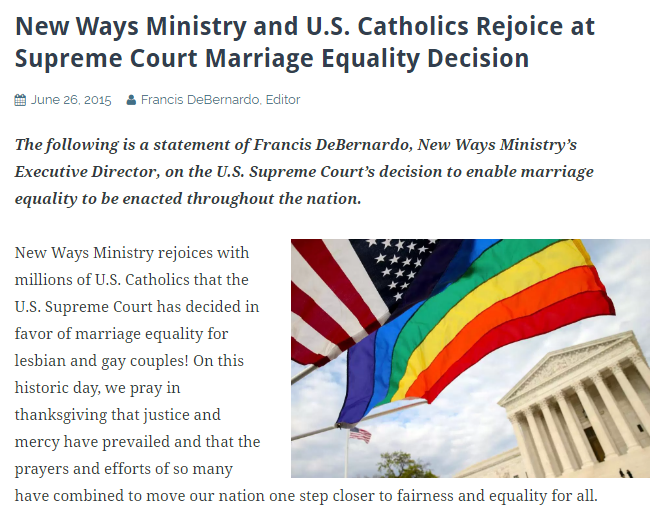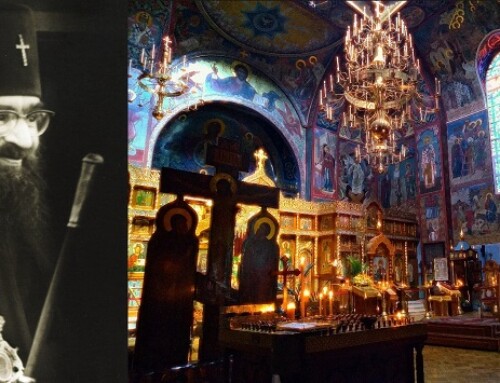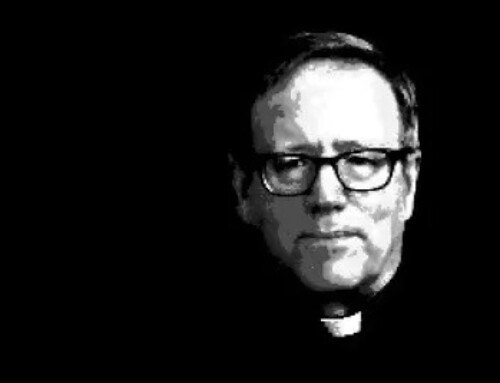Recently, Bishop John Stowe gave an interview in which he defended his decision to attend a symposium organized by New Way Ministry. He compared those who dare to even question that decision to the pharisees:
“…the pharisees and the scribes that Jesus is frequently arguing with in the gospel who are quick to point their fingers at others and quick to lay burdens on them without themselves offering a finger to lift their load.”
Is the good Bishop referring to someone like me? I am ex-gay and for many years I have outreached to the “gay” community. While I certainly have compassion for those who are still trapped within the lie of homosexuality, I nevertheless refuse to facilitate or perpetuate in any way the inherent confusion which surrounds that lie. Instead, I have chosen to share the Truth of the Gospel, as difficult as it often sounds, with those who have never heard it, or have only been exposed to the misleading theology that God made me “gay” or that someday the Catholic Church will change its teachings on homosexuality.
I have dedicated my life to this, because I once lived in that delusion; constantly reading the works of John J. McNeill, John Boswell, and Robert Nugent and Jeannine Gramick. All these years later, the only result of those wasted words, by yet another false prophet, has been the death of so many who were clearly deceived. For I knew men, sometimes wavering in their allegiance to homosexuality, who became convinced through the teachings of McNeill, Boswell, Gramick and others that they were indeed “gay” and that God thought it was good. Then, they remained tied to something that they thought they were; or, more precisely, to a false idea of themselves. They listened to those who told them what they wanted to hear; that nothing was wrong; that they needed to have faith in who and what they were. Later, many of them died of AIDS. Yet, a number of those who were complicit in these misdeeds, which caused many to lose their lives, prosper on and continue to spread the same errors.
In the same interview, Stowe was asked about the possibility of change in Church teachings with regards to homosexuality:
“For a person who is self-identified as gay or lesbian as a Catholic – you would say that they can hold out in their spirit, if not in their lifetime, that there is a possibility that someday the Church could view those acts [homogenital acts] as morally licit?”
He answered with: “I don’t want to go that far; I don’t know if that would ever be the outcome of it.”
“I don’t know…” I saw men die because of such ambiguity. Because they were being counseled by priests who confused compassion and mercy with purposefully hiding, or deliberately and unnecessarily complicating the Truth. Yet this hesitancy goes part and parcel with what Stowe judges as “not helpful” language in the Catechism with regards to homosexuality. Is it possible to ease someone into the Truth? That question is even more problematic when one considers those who have already been misled and victimized by the deceptions of New Ways Ministry. In this case, the treatment for a severe wound, which has been allowed to fester, is often incredibly unpleasant.
When I first sought guidance from the Church, I regrettably encountered a few priests who advised me that the best I could possibly do as a “gay” man was to enter into a stable same-sex relationship. Year before, when I was much younger, I heard the same thing. Back then, I believed them because we agreed. But I had seen the devastation wrought by the “gay” lie in the lives of my dead friends, and in my own battered body, so I instantly knew – I was not being told the Truth. Blessedly, I met a priest, courageous as well as kind, who knew I wasn’t “gay.” He also thought enough of me to offer the forgiveness of Christ through Confession and the complete fullness Truth as contained in the Catechism; he literally handed me the book with the page marked. Yet, far from being off-putting, it made incredible sense. For how else could you explain my own futile efforts to deconstruct relationships and sex into a highly relativistic concept, or, more importantly, make sense out of the senseless and grisly demise of so many young men, but as a result of being lost in a world of “disorder?” St. Josemaria Escriva once said:
The surgeon knows that the cleaning hurts, but he also knows that there will be worse pain later if it is not done…If it is obvious that such measures must be taken to protect bodily health, although it may only be a relatively minor wound, then when the health of the soul is at stake — the very nerve centre of a man’s life — how much more necessary it is to wash, to cut away, to scrape, to disinfect, to suffer!
I believe that many who become involved with Catholic LGBT ministries are initially people of good intention, but they later become facilitating: while trying to protect those they have compassion for, from any sort of hurt feelings, or difficult realities, or suffering, those for instance that Stowe described in New Ways Ministry who: “feel hurt because the Church defines them as intrinsically disorder.” Then, in what is ultimately a self-serving attempt to receive admiration from those they should council with Mercy and Truth, LGBT ministries tend to solely agree with those they should be challenging. For example, what you assuredly do not want to do is hide inside ambiguity – giving an answer which seems to indicate that change in Church teachings is a distinct possibility. For those who are often the members and participants in these ministries are keenly aware of almost any utterance from someone in authority within the Church which could possibly be interpreted as gay-affirmative. For this reason, those at New Ways Ministry became aware of Stowe’ rather obscure address to the Conference of Major Superiors of Men and they subsequently invited him to their Symposium.
When questioned further about the possibility of change in Church teachings, Stowe said:
“Change does come over a long period of time in the way that the Church approaches a number of issues. We cannot hide ourselves by excluding ourselves from scientific research and from the development of human knowledge. We also have to interpret that…that is the role of theologians in the Church.”
He continued: “We can look at the example of usury, that’s one that’s often brought up where you don’t hear the Church condemning banks…so that’s something we had to evolve in our understanding despite the fact that you can find clear Old Testament prohibitions of it.”
Then he added: “There was a time when the Church ignored or justified through Scripture the existence of slaves, so we can’t say these teachings are immune from ever changing.”
Stowe’s talking points are arguably pulled from the false sort of theology that has been expounded in “gay” Catholic circles and LGBT ministries for many years:
The late former-priest John J. McNeill, S.J., once wrote:
“…cautious investigation of the intention of the human author is especially called for in dealing with the biblical passages which traditionally been accepted as dealing with homosexual activity. We are keenly aware that back in the days of slavery, slave owners regularly quoted passages from scripture to justify keeping slaves as God’s will. There is a real possibility that the homophobia of the translators and their culture has led to a distortion of the meaning of scripture.”
What Stowe said is also similar to something the famous gay-apologist Fr. Charles Curran believed:
“…not everything that has been taught by the popes and all of the bishops together is necessarily infallible. Otherwise, how could we change our teaching on usury? How could we change our teaching on slavery?”
Speaking at symposium sponsored by New Ways Ministry in 1981, Curran said:
“The normative ideal is heterosexuality, but because some people, through no fault of their own, are homosexual, homosexual actions in a committed relationship striving for permanency can be objectively good.”
As recently as 2016, Sister Jeannine Gramick, one of the co-founders of New Ways Ministry, wrote:
“…the Vatican congregation has expressed concern about public dissent from church teaching. Apparently, the congregation prefers that individuals and groups keep silent if they dissent.
Rather than be alarmed, the congregation should view accusations of dissent as possible signs of vitality. How has our church been able to change over the centuries, if not by dissent? Modifications in the church’s position on slavery, usury, and salvation outside the church are the usual examples of doctrinal change all affected by public dissent.”
And Robert Nugent, the other co-founder of New Ways Ministry, left open the possibility for a radical reinterpretation of Scripture:
“Same-gender expressions of responsible, faithful love in a covenanted relationship between two truly homosexually oriented people not gifted with celibacy is not something envisioned by the Scriptures. Whether this form of homosexuality violates biblical or anthropological principles of sexuality and personhood — especially in the light of current scientific knowledge and human experience about the homosexual orientation — is a key issue facing the churches and religious groups today.”
It’s also telling that co-founder of New Ways Ministry Sister Jeannine Gramick said in a 2011 interview: “But because I know church history, I know change takes centuries. We are planting seeds for change at the upper level of leadership.”
Therefore, again, you can see exactly why New Ways Ministry invited Stowe, not because he represents a drastically different point of view, which they desperately need to hear, but because he simply repeats and therefore affirms many of their own misinterpretations. This is similar to the relationship between New Ways Ministry and the former Auxiliary Bishop of the Archdiocese of Detroit Thomas Gumbleton, who is also speaking at the same symposium as Stowe.
At a 1996 symposium for New Ways Ministry, Gumbleton said:
“I hope that within our Church every gay person, every lesbian person, every bisexual person and every transgendered person will come out. Because that is how our Church will truly change….”
In a 2013 interview, Gumbleton said:
“..the fact that homosexuality is not something chosen, that this is part of the person, who the person is, and therefore, you can’t talk about these people as being intrinsically disordered.”
In the “gay” community, we have many family members, friends, organizations, churches, and even the Supreme Court of the United Sates which agree with us; what we lack are those brave enough to question our assumptions.
The late Fr. Benedict Groeschel, who often counseled men with same-sex attraction, remembered:
Once, a young man who had given up the fight to live chastely and had decided to have a live-in homosexual relationship made two requests of me. He said, “Don’t reject me, and don’t agree with me. If you agree with me I will never get out of this.”
Postscript: Bishop Stowe also said: “[New Ways Ministry] invited some serious scholars to address the group…”
Here is an example of what one of those “serious scholars” recently wrote; in 2016, Lisa Fullam argued that Catholic Church’s teachings against homosexuality are equivalent to anti-semitism:
Official Catholic teaching on homosexuality seeks to distinguish orientation from practice, but when magisterial teaching couches that sentiment in language like “depravity,” “intrinsic disorder,” “objective moral evil,” “threat to society,” it really does seem to go further than a condemnation of acts. Further the wholesale magisterial rejection of the possibility of loving, truly unitive same-sex intimate relationships is more than a rejection of particular sex acts; it strikes at the very human dignity of LGBTQ people by denying them the right to share their lives with a partner… Not since we renounced murderous anti-semitism (still a lingering wound to be sure) has a category of human beings been described in such harsh language.
More information:






What can the faithful do, Joseph? This is so disheartening. I pray that you will have the gift of final perseverance. If I wanted a church that looked like and believed like the world, I wouldn’t have become Catholic. Thank you for speaking the truth, or I may have just as easily seen nothing wrong with this nonsense.
And here we are, a year later, and Bishop Stowe adamantly continues in his homosexual advocacy. He is now leader of Pax Christi, following in the footsteps of full- time dissenter, Thomas Gumbleton. He is ecclesial advisor to Fortunate Families, based here in Lexington. He is doing his best to corrupt Lexington Catholic High School, getting Fortunate Families’ director a chance to address Lexington Catholic’s faculty. And we have a downtown church displaying a homosexual banner during “Pride” month.